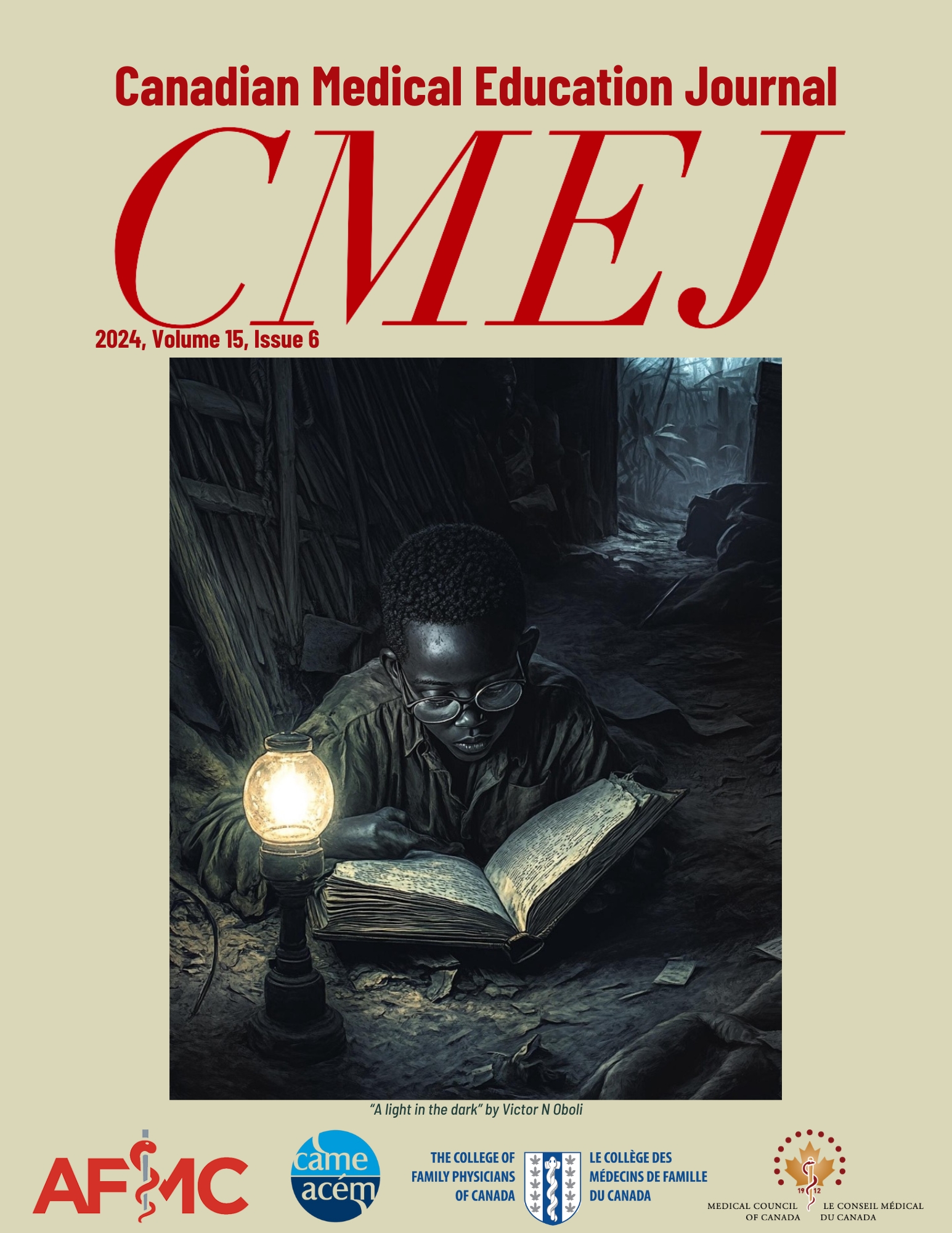Resident perceptions of learning challenges in concussion care education
DOI:
https://doi.org/10.36834/cmej.78016Abstract
Background: Resident-focused curricula that support competency acquisition in concussion care are currently lacking. We sought to fill this gap by developing and evaluating Spiral Integrated Curricula (SIC) using the cognitive constructivism paradigm and the Utilization-Focused Evaluation (UFE) framework. The evidence-based curricula consisted of academic half-days (AHDs) and clinics for first- and second-year family medicine residents. Our first pilot evaluation had quantitatively demonstrated effectiveness and acceptability but identified ongoing challenges. Here we aimed to better describe how concussion learning is experienced from the learners’ perspective to understand why learning challenges occurred.
Methods: A qualitative interpretative cohort study was utilized to explore resident perceptions of concussion learning challenges. Participants completed six monthly longitudinal case logs to reflect on their concussion experience. Semi-structured interviews were conducted.
Results: Residents' beliefs and perceptions of their roles influenced their learning organization and approaches. Challenges were related to knowledge gaps in both declarative knowledge and knowledge interconnections. Through reflection, residents identified their concussion competency acquisition gaps, leading to transformative learning.
Conclusion: This Spiral Integrated Design created vigorous processes to interrogate “concussion” competency gaps. We discussed resident mindsets and factors that hindered “concussion” learning and potentially unintentional negative impacts on the continuity of patient care. Future studies could explore how to leverage humanistic adaptive expertise, cross-disciplines for curriculum development, and evaluation to overcome the hidden curriculum and to promote integrated education and patient care.
References
Langer L, Levy C, Bayley M. Increasing Incidence of Concussion: True Epidemic or Better Recognition? J Head Trauma Rehabil. 2020 Jan;35(1):E60-6. https://doi.org/10.1097/HTR.0000000000000503 DOI: https://doi.org/10.1097/HTR.0000000000000503
Zemek RL, Grool AM, Rodriguez Duque D, et al. Annual and seasonal trends in ambulatory visits for pediatric concussion in Ontario between 2003 and 2013. J Pediatr. 2017 Feb;181:222-228.e2. https://doi.org/10.1016/j.jpeds.2016.10.067 DOI: https://doi.org/10.1016/j.jpeds.2016.10.067
Ellis MJ, Bauman S, Cowle S, Fuselli P, Tator CH. Primary care management of concussion in Canada. Paed Child Health. 2019 May 15;24(3):137-42. https://doi.org/10.1093/pch/pxy171 DOI: https://doi.org/10.1093/pch/pxy171
Stoller J, Carson JD, Garel A, et al. Do family physicians, emergency department physicians, and pediatricians give consistent sport-related concussion management advice? Can Fam Physician. 2014 Jun;60(6):548, 550-2.
Mann A, Tator CH, Carson JD. Concussion diagnosis and management: Knowledge and attitudes of family medicine residents. Can Fam Physician. 2017 Jun;63(6):460-6.
Boggild M, Tator CH. Concussion knowledge among medical students and neurology/neurosurgery residents. Can J Neurol Sci. 2012 May;39(3):361-8. https://doi.org/10.1017/S0317167100013524 DOI: https://doi.org/10.1017/S0317167100013524
Patton MQ. Utilization-focused evaluation. 4th ed. Thousand Oaks: Sage Publications; 2008. 667 p.
Kam ASH, Zhao G, Huang C, et al. Residency spiral concussion curriculum design. Clin Teach. 2023 Nov 30;e13707. https://doi.org/10.1111/tct.13707 DOI: https://doi.org/10.1111/tct.13707
Kam A. Impact on resident competency acquisition: near-peer teaching in a spiral curriculum. The 2023 American Educational Research Association (AERA) Annual Meeting; 2023 May 4. DOI: https://doi.org/10.3102/2007097
Rojas Gualdron D, Parker K. Evaluation in health professions education: Enhancing utility and supporting innovation. Clin Teach. 2021 Dec;18(6):621-6. https://doi.org/10.1111/tct.13416 DOI: https://doi.org/10.1111/tct.13416
Cupido N, Ross S, Lawrence K, et al. Making sense of adaptive expertise for frontline clinical educators: a scoping review of definitions and strategies. Adv in Health Sci Educ. 2022 Dec; 27(5):1213-43. https://doi.org/10.1007/s10459-022-10176-w DOI: https://doi.org/10.1007/s10459-022-10176-w
Braun V, Clarke V. Using thematic analysis in psychology. Qual Res Psychol. 2006 Jan; 3(2):77-101. https://doi.org/10.1191/1478088706qp063oa DOI: https://doi.org/10.1191/1478088706qp063oa
Ambrose SA, editor. How learning works: seven research-based principles for smart teaching. 1st ed. San Francisco, CA: Jossey-Bass; 2010. 301 p. (The Jossey-Bass higher and adult education series).
Brauer DG, Ferguson KJ. The integrated curriculum in medical education: AMEE Guide No. 96. Med Teach. 2015 Apr 3;37(4):312-22. https://doi.org/10.3109/0142159X.2014.970998 DOI: https://doi.org/10.3109/0142159X.2014.970998
15. Johnson LW, Diaz I. Exploring the Social Determinants of Health and Health Disparities in Traumatic Brain Injury: A Scoping Review. Brain Sci. 2023 Apr 23;13(5):707. https://doi.org/10.3390/brainsci13050707 DOI: https://doi.org/10.3390/brainsci13050707
16. Lane AS, Roberts C. Contextualised reflective competence: a new learning model promoting reflective practice for clinical training. BMC Med Educ [Internet]. 2022 Dec [cited 2023 Jul 6];22(1):71. Available from: https://bmcmededuc.biomedcentral.com/articles/10.1186/s12909-022-03112-4 https://doi.org/10.1186/s12909-022-03112-4 DOI: https://doi.org/10.1186/s12909-022-03112-4
Sandars J. The use of reflection in medical education: AMEE Guide No. 44. Med Teach. 2009 Aug;31(8):685-95. https://doi.org/10.1080/01421590903050374 DOI: https://doi.org/10.1080/01421590903050374
CaRMs. 2023 Family medicine/enhanced skills match. Available from: https://www.carms.ca/wp-content/uploads/2023/03/fmes1e.pdf [Accessed on Aug 29, 2023 Aug 29].
Downloads
Published
Issue
Section
License
Copyright (c) 2023 Alice Kam, Tobi Lam, Irene Chang, Ryan S Huang, Nicolas Fernandez, Denyse Richardson

This work is licensed under a Creative Commons Attribution-NonCommercial-NoDerivatives 4.0 International License.
Submission of an original manuscript to the Canadian Medical Education Journal will be taken to mean that it represents original work not previously published, that it is not being considered elsewhere for publication. If accepted for publication, it will be published online and it will not be published elsewhere in the same form, for commercial purposes, in any language, without the consent of the publisher.
Authors who publish in the Canadian Medical Education Journal agree to release their articles under the Creative Commons Attribution-Noncommercial-No Derivative Works 4.0 Canada Licence. This licence allows anyone to copy and distribute the article for non-commercial purposes provided that appropriate attribution is given. For details of the rights an author grants users of their work, please see the licence summary and the full licence.











